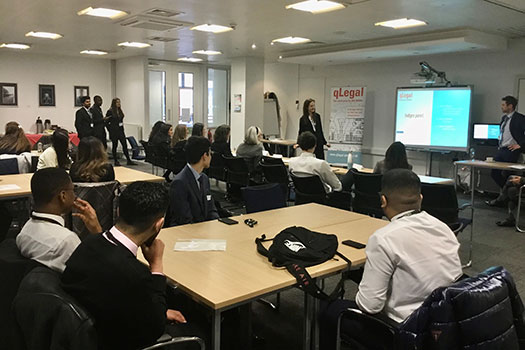Determined by nature, qLegal students adapt to a new way of working

The year has come to a natural end for qLegal’s programmes as students move into exams and dissertation phases, but the last couple of months have felt anything but natural. The usual buzz of activity in the qLegal space - students collaborating on advice letters and Legal Design projects, rehearsing legal workshops and developing classes on entrepreneurship for school pupils - receded bit by bit into a hush as students returned home while the pandemic took hold. But quietly, behind their screens across all parts of the world, the collaboration and activity continued. The dedication and determination have been remarkable.
Students on the 1-1 advisory programme continued to provide tailored written advice to entrepreneur clients. Remotely, they interviewed clients, researched the law, and drafted advice letters, liaising with external supervising lawyers throughout. Perhaps a more realistic simulation of international commercial legal practice where clients and colleagues may be in other time zones, the students took to it well.
Quick thinking and creativity were the hallmarks of students on the StreetLAB schools outreach programme. For two semesters they had designed and delivered interactive classes on law and business to pupils in disadvantaged areas. The culmination of all this effort was to be a mini-incubator hosted at a prestigious City venue, where the pupils pitched their business ideas to a panel of expert judges. With sadness, our hosts and external partners were unable to continue in the final weeks, and the threat of school closures was imminent. Undaunted, the qLegal students managed to deliver two mini-incubators, one in each participating school, just before they shut. The enthusiasm was overwhelming.
The Legal Design students’ pitch was scheduled for the end of March. They were competing in teams to create a Legal Design course, using Design Thinking methodology – a process that emphasises empathy with end users and promotes innovation. Such was their dedication, the students pitched via video conference from all over the world, including one student in Kenya who was in quarantine. The winning team’s prototype will be used to benefit future qLegal students.
Students on the Future Clients programme similarly showed flexibility and took a longer view. They used their business development and networking skills to pitch qLegal across all Queen Mary faculties, identifying areas for collaboration between law students and those from other disciplines, in recognition that the real world isn’t neatly packaged into distinct fields. When face-to-face meetings weren’t possible, they created online surveys and used social media to engage.
Also, technology is central to the experience of many students on the Externship programme, who augmented their academic study and reflective learning with time helping out in tech start-ups. They too continued to engage remotely where possible, including a group of four students who extended their externship to work on the development of a chatbot, providing legal support to SMEs struggling to cope in the crisis.
For at least a decade there has been much discussion on the Future of Work, with an emphasis on the need for adaptability, resilience, creativity and emotional intelligence. If the qLegal experience is anything to go by, it seems the future is in good hands with the next generation of talent.